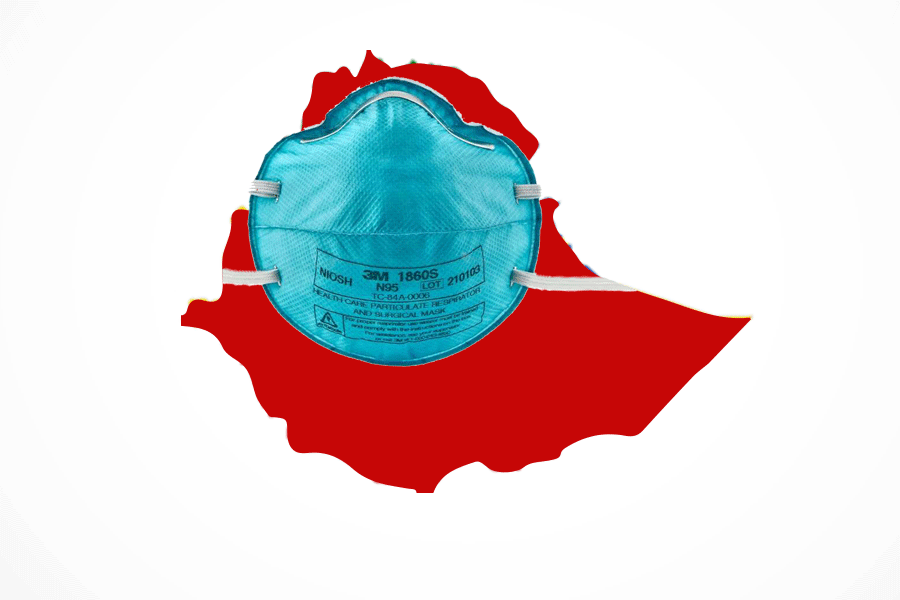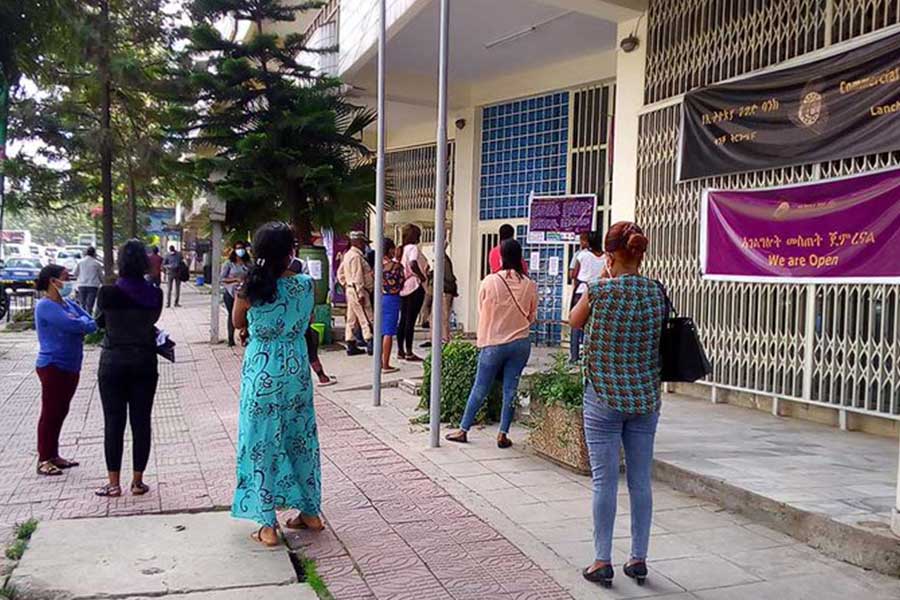
Covid-19 | May 01,2020
Keeping up with the skyrocketing rent, medical costs, transport and commodity prices has become a struggle for a diabetic army veteran in his late 60s, Wondemagen Feleke.
On average, he spends about 200 Br when he visits the state-owned Zewditu Memorial Hospital twice a week for dialysis treatment.
He is one of the 12 million households that benefit from Community Based Health Insurance (CBHI); a scheme launched a decade ago by the Ministry of Health to subsidise medical expenses for citizens earning low income in the informal sector.
While grateful for qualifying to use the service, Wondimagegn bemoaned the struggles to get the rebates back as beneficiaries are refunded the amount at a later date when they buy medicine outside of public pharmacies.
“I usually don’t find medicine in the hospital,” he said.
His family of five relies on his wife's fluctuating income as a housekeeper while the constant purchase of medicine on the rise has him deeply concerned.
To make matters worse, the long commute from his two-room house in the Sebeta area of the recently formed Sheger City, 22Km away from the capital has him emptying his pockets further.
"It's exhausting to come this far so often," he told Fortune.
Covering the costs of basic necessities such as food, housing, health and transport is about to get tougher for residents of Addis Abeba that barely make ends meet.
A population struggling to cope with galloping inflation rates currently quivering at around 33pc is struck by the gloom and drear of an austere 801 billion Br budget that foreshadows cutbacks on several fronts.
The health sector is an area where dire times have forced the government to cap the budget at 16 billion Br for next year.
Even with a two billion Birr increment from the ended budget year, the share of the health sector is barely two percent of the total, despite a 15pc allocation of the national budget for the sector entailed by members of the African Union at Abuja Declaration.
Shortages of beds, drugs, and physicians are but a few of the ails faced by the 353 public hospitals where close to 56 million individuals from 130,000 households are presumed to be active users of the Community-Based Health Insurance (CBHI) scheme.
A Social Health Insurance (SHI) slated to subsidise citizens working in the formal sector has been halted due to budget constraints.
Online public health journal, BMJ Global report categorizes Ethiopia as having one of the least subsidized healthcare economies in the world. It states that citizens are trapped between paying exaggerated medical costs or getting no medical attention.
Muluken Argaw (PhD), deputy director of the Ethiopian Health Insurance Agency, acknowledges that fiscal pressure has squeezed funding out of the health sector over the past two years, curtailing the provision of medication and new beneficiaries.
He said a 1.5 billion Br budget has been proposed by the Agency for the 25pc subsidy next year, showing a half a million Birr increase from this year. The Addis Abeba City cabinet has approved 181 million Br to subsidise the insurance scheme during the budget year.
According to Muluken, addressing pharmaceutical issues heavily strangled by the foreign currency crunch will be the primary target for the coming year.
"We adjust our projects based on the budget," he told Fortune.
Burdens of the austere budget extend to prices of food commodities. The prices of teff and wheat have risen by 45pc and 14pc within the past five months while headline inflation hovers at around 28pc.
The four billion Birr addition to the budget for fertilizer imports is offset against the 30pc rise in international prices which does little to a sector plagued with a foreign currency crunch.
The price hike is exacerbated by low production owing to supply chain disruptions during the war between Russia and Ukraine as the two countries produce around a quarter of the world's fertilizer.
According to the nine-month performance report of the Ministry of Agriculture, only 477,000tns of the demanded 1.3 million tons were brought into the country where State Minister Sofiya Kassa (PhD) attributed the delay to the forex squeeze despite the increased budget.
Although the Ministry plans to collect 67 million quintals of teff in the current fiscal year, experts foresee a dwindling yield recalling that farmers from Amhara Regional State, which account for close to half of the total production, had gone on protest due to the delayed fertilizer supply last month.
World Bank report suggests Ethiopia's average fertiliser consumption stands around 36Kg per hectare. Following Russia's war in Ukraine, the price of a quintal of fertiliser increased by up to 80pc last year.
In the fourth quarter, Ethiopia’s cost of fertiliser imports surged by 229pc, to 870 million dollars; equivalent to five percent of the proposed total budget for next year.
Adela Muluye is a farmer from Enema town in the Amhara Regional State with an eight-hectare plot.
He said that the price of fertilizers spiked to 5,000 Br per quintal. However, he has not received the 12qtl UREA from the unions for his barely and teff produce since April.
The farmer is anxious over the dwindling production by half from the 10qtl expected yield per hectare that follows the scarcity. According to Adela, an expanded supply of UREA and DAP is needed to increase production rather than recommendations to increase the use of liquid fertilizers and compost that do not take covering large plots into account.
"We're extremely dependent on fertilizer," he said.
Agroeconomists warn the soaring price of fertilizers will have an impact on production and price.
The field study conducted by Yadeta Bekele, economist and researcher, on one of the highest teff-producing areas around the Kersa area in the Oromia Regional State, reveals that farmers are opting to leave their plots unattended due to fertilizer scarcity.
"Scarcity and the high price of fertilizers ultimately increase the price of food items," he told Fortune.
Economic conditions have not been kind to consumers such as 24-year-old widow Seada Nesru either.
She collects trash to dump into the garbage trucks that come by each morning. A little short of half of the 5,400 Br monthly salary goes to pay rent for the single room she shares with her five-year-old daughter near the Gofa Mebrat Hail condominium.
After buying a five-litre cooking oil for 850 Br, she scrapes by the rest of the month, eating as little as she can while trying to make sure her daughter does not starve.
Although the Addis Abeba City Administration prohibited increasing rent until the first of July, coinciding with the deadline for the recently revised property tax rate, a recent notice of an additional 500 Br fee was put up by the landlord.
"I don't know how to go on," she said in a defeated tone.
Growing population numbers have pushed housing demand to all-time highs with the conflation of conflict, drought and extreme poverty forcing millions to flow into the capital as the country averages 4.9pc expansion of cities.
Meanwhile, a six billion Birr lower budget awaits the Ministry of Urban Development & Infrastructure for the next fiscal year, capped at 12 billion Br. Although the current budget year draws to a close, the Ministry has not been able to complete a quarter of the half a million homes it has planned to build, chalking it up to unprecedented increments in the price of construction inputs.
Rita Abreha, an advisor at the Housing Development & Design department of the Ministry, says the price hikes in cement and steel impacted the performance of the Ministry with an outcome quite below expectations.
Going forward, Rita observes the role of the government is restricted to creating an enabling environment for the private sector while utilising alternative construction methods such as aluminium form.
"Government's share in housing development will continue to decrease," Rita told Fortune.
A 2021 study by T. Matsumoto and J. Crook on sustainable and inclusive housing in Ethiopia depicts that government-provided housing through free or subsidized schemes only accounts for 3.36pc of the total. The researchers indicated that minimal intervention of the government leads to a large informal sector filled with illegal actors, leaving tenants at the mercy of their landlords.
For the economist Shewaferaw Shitahun, the budget proposal put forth by the Ministry of Finance clearly indicates a country getting ready to waddle through austerity measures. He called the lofty tax revenue target of 440.8 billion Br by the Ministry "largely out of reach" in line with the current business climate.
"Such ambitious plans escorted by new taxes are likely to stir public discontent," Shewaferaw told Fortune.
Reflecting on austerity measures of other countries such as South Africa and Greece, who apportioned a huge portion of their budget to service debts while nipping the budget, the expert forewarned of possible turmoil when the government foregoes service provisions.
PUBLISHED ON
Jul 01,2023 [ VOL
24 , NO
1209]

Covid-19 | May 01,2020

Covid-19 | Mar 28,2020

Commentaries | Jun 03,2023

Commentaries | Sep 10,2022

Radar | Jun 24,2023

Fortune News | Mar 11,2023

Sunday with Eden | Jul 12,2025

Sunday with Eden | Apr 28,2024

Fortune News | Jun 20,2020

Viewpoints | Oct 05,2024

Dec 22 , 2024 . By TIZITA SHEWAFERAW
Charged with transforming colossal state-owned enterprises into modern and competitiv...

Aug 18 , 2024 . By AKSAH ITALO
Although predictable Yonas Zerihun's job in the ride-hailing service is not immune to...

Jul 28 , 2024 . By TIZITA SHEWAFERAW
Unhabitual, perhaps too many, Samuel Gebreyohannes, 38, used to occasionally enjoy a couple of beers at breakfast. However, he recently swit...

Jul 13 , 2024 . By AKSAH ITALO
Investors who rely on tractors, trucks, and field vehicles for commuting, transporting commodities, and f...

Oct 11 , 2025
Ladislas Farago, a roving Associated Press (AP) correspondent, arrived in Ethiopia in...

Oct 4 , 2025
Eyob Tekalegn (PhD) had been in the Governor's chair for only weeks when, on Septembe...

Sep 27 , 2025
Four years into an experiment with “shock therapy” in education, the national moo...

Sep 20 , 2025
Getachew Reda's return to the national stage was always going to stir attention. Once...